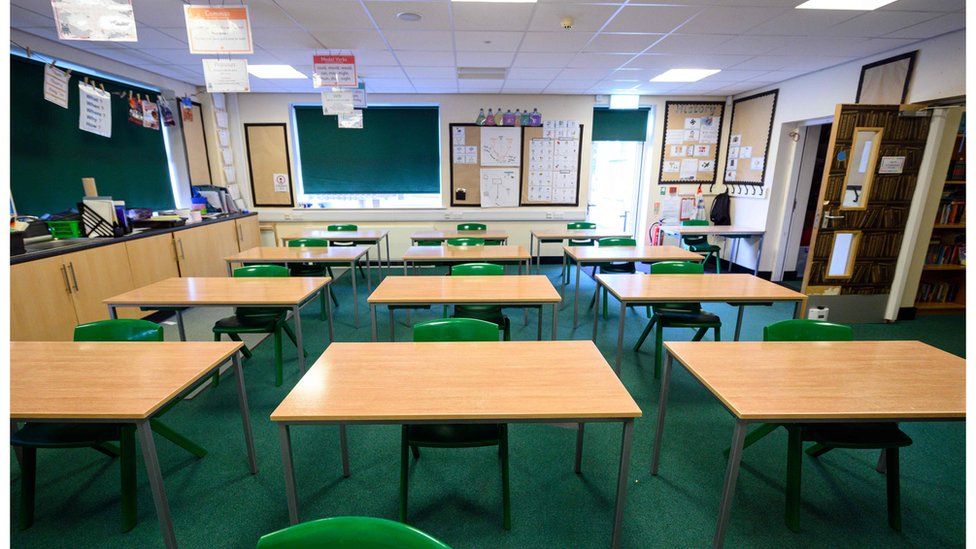Ireland: Education minister rules out stats tool for exam grades
Publicado: 3 febrero 2021 a las 12:00 am
Categorías: Noticias Europa
Ireland/February 03, 2021/By Robbie Meredith- BBC News NI Education Correspondent/Source: https://www.bbc.com/
Schools in Northern Ireland will calculate GCSE, AS and A-Level grades to be awarded to their pupils in 2021.
The NI exams board CCEA will then review how schools award grades to “ensure fairness and consistency”.
But there will not be a return to the kind of statistical process used by CCEA which proved controversial in 2020.
The arrangements to award pupils their qualifications have been outlined by Education Minister Peter Weir.
However, there is still uncertainty for pupils in year 11 and year 13 taking GCSE modules and AS Levels.
Pupils in year 11 taking GCSE units or modules will not be awarded grades this summer.
The exception will be pupils taking GCSE Maths who plan to study GCSE Further Maths in Year 12 and GCSE Irish students who will move on to study GCSE Gaeilge.
No decision has yet been made on whether AS results awarded in 2021 will count towards a pupil’s A-Level grade in 2022.
Mr Weir’s move comes after summer exams were cancelled due to the coronavirus pandemic for the second year in a row.
Prior to Christmas, Mr Weir had hoped exams would go ahead in 2021 but said that students would sit fewer of them.
However, he subsequently decided that summer exams for GCSEs, AS and A-Levels should not take place in 2021.
In the assembly on Tuesday, Mr Weir said that “more weight” would be given to the “professional judgement of teachers” in awarding qualifications in 2021.
“This year there will be no statistical standardisation using an algorithm,” he said.
He said that the grades awarded to pupils would be based on work they had completed in school.
 IMAGE COPYRIGHTPA MEDIA
IMAGE COPYRIGHTPA MEDIASchools can use work pupils have completed while learning remotely to award grades as well as work completed in class.
Many pupils taking GCSE, AS and A-Level spent four months out of class during the 2019-20 school year and are set to be out of school for at least two months this school year.
However, the minister said that in April, CCEA would also provide schools with tests to use to assess pupils.
“CCEA will also make available to all schools and colleges assessment resources which may be used as part of the broad portfolio of evidence,” he said.
“These resources will be repurposed papers, providing unseen questions and an associated mark scheme,” he said.
CCEA ‘to review grades’
But Mr Weir said that using those tests would be optional for schools.
“They are not exams and should not be treated as such,” he said.
“The assessment resources can be used alongside a range of other evidence and the emphasis should be on a broad portfolio of evidence and not a single source.”
Schools will have to submit the grades they think pupils should be awarded to CCEA at the end of May.
Mr Weir said that CCEA would then “review” and compare the grades awarded by schools to try to ensure they have provided results based on similar standards.
“Work from every school and college across Northern Ireland will be reviewed,” he said.
If CCEA is concerned that the grades awarded by a school are not accurate, they may ask the centre to re-run the results process.
Mr Weir said that no student should be penalised if they were unable to complete any part of a course during a period of school closure or a period of self-isolation.
Pupils will be able to appeal their grades if they are unhappy with the process for awarding them but teachers and schools will again be indemnified against legal challenges over exam grades.
The minister also said it was planned that pupils would still receive their results in late August as usual.
However, he said there would be discussions with the Department of Education in England over when pupils would get results as there is a possibility that grades will be provided in England in July.
News Source:
Deja un comentario